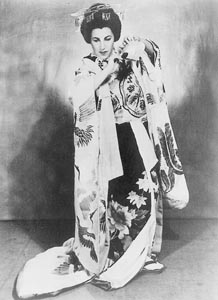![[MetroActive Stage]](/stage/gifs/stage468.gif)
[ Stage Index | Santa Cruz Week | MetroActive Central | Archives ]
 Deference to a Diva: Capitola's Bay Shore Lyric Opera flys to a traditional style of opera with 'Madama Butterfly,' directed by leading Puccini performer Licia Albanese (above). Taking Flight Soprano Licia Albanese brings a passion for detail, beauty and dramatic projection to Bay Shore's 'Butterfly' By Jenna Conner
LEGENDARY SOPRANO Licia Albanese, seated in the Capitola Theater's lobby wearing a stylish blue and pink suit, her dark, barely peppered hair elegantly pinned back, appears far younger than her 87 years. Looking at her darkly lined bright eyes, dramatically arched eyebrows, pale skin and delicate figure, I can see how the celebrated singer earned a reputation from theater critics as "the frailest Mimi, the tenderest Butterfly and perhaps the most haunting of modern Violettas" during her heyday with the New York City Opera. True to her commanding diva presence, the former prima donna of the Italian repertoire immediately begins a chatty monologue that is virtually impenetrable to a nosy reporter's questioning, but highly susceptible to itinerant interruptions by salutating theater staff, well-wishers and students. Decrying modern opera singers' diets, heavy figures and lack of fluency in different languages, the soprano admits she has given up on attending any modern opera performances. "They don't do anything for me," she complains, her eyes registering stern vexation before fading into a look of sad disappointment. "They sing without heart. I don't want to suffer. I don't see actors and actresses like there was in my time. They don't make opera like they used to." In directing Bay Shore's production of Madama Butterfly, which opens Saturday at the Capitola Theater, the passionately concerned Albanese attempts to return opera to a bygone golden era she remembers so fondly. Demanding that Bay Shore's production hold to the stringent standards of acting and singing she furthered during the 1940s and '50s, Albanese is tirelessly obsessed with details. "Jennifer!" she suddenly calls out to a cast member wandering by in a pink, embroidered Japanese costume minutes before rehearsal. "Fix your kimono! Your steps have to be small." A MASTER OF PLAYING Cio-Cio-San, a role she became renowned for during her 20 seasons at the Metropolitan and San Francisco operas, Albanese stresses the nuances that comprise the part--the appropriate tightness of a properly fitted kimono, the tiny steps a geisha should take, the delicacy of Cio-Cio-San's movements, which must mimic the fragility of a butterfly. What becomes apparent during rehearsal is that dramatic projection to the audience is of utmost concern for the diva director. Again and again she brings rehearsal to a standstill in order to point out just how cast members should move their body, position themselves or communicate emotions. "No, no, no!" she cries almost inaudibly under the powerful voice of the mourning soprano, fiercely shaking her head in protest. "Like this," she instructs, letting her voice and body demonstrate some correction to the soprano watching her intently from the front of the makeshift set. Albanese also emphasizes using language instead of music to direct a singer's voice, a quality she insists is lacking in today's singers. "They think only of notes," she remarks. "I tell them, 'Put your words in voice. Project the voice.' You have to sing what the words tell you to do. The meanings of the words makes the voice more beautiful." Madama Butterfly is Albanese's third directorial effort, and she is ecstatic to lead a production by a composer who she believes reigns supreme. "Puccini is the king of melodies," she says. "I don't know what's better, the words or the music."
Bay Shore Lyric Opera's production of Puccini's Madama Butterfly runs Saturday, April 15, 28-29 and May 7 at 8pm, Sunday and April 30 at 3pm. $27 gen/$22 students and seniors. (462.3131) [ Santa Cruz Week | MetroActive Central | Archives ]
|
From the April 5-12, 2000 issue of Metro Santa Cruz.
Copyright © Metro Publishing Inc. Maintained by Boulevards New Media.